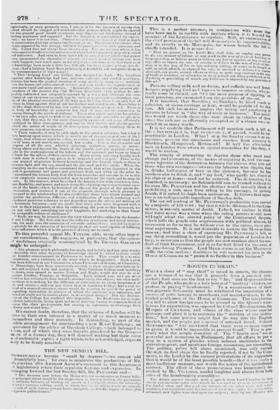THE NEW SUNDAY BILL.
ftINDAY-BILLS become "Small by degrees"—we cannot add beautifully less;' for even in miniature the productions of' Mr. PLUMPTRE (Sir ANDREW AGNEW'S successor in this department .1 legislation) retain their repulsive features and expression. In bringing forward the last Sunday-bill, Mr. PLUNIPTRE said- " The measure now before the House was not so extensive as former bills ; us principal object would be the suppressioo of Stiteley trading, the pa evention .1 ordinary business, of trading on cauals am llAYig.ilile tivers, she labour lull d men's CO»1011114 colliny, work, or trade,1,111 or selling, goals or animals, :e sale of milk during certain hours excepted, ..s also the supply of bons; fide in public-Louses." Thin is ft modest attempt, in comparison with setae thtt have been male to meddle with matters whieh it is boyond the province of the Legislature to regulate. Still, an examMatioa the eltiof provision of the bill will demonstrate its impracticability, amid its cruelty in thi: Metropolis, for whose benefit the bin chiefly intended. It is propos. d- " That no person on the Lord's ply shall hire. or employ any per to do, any manner of labour, or any work in Ilse wag iy* ira,le or business or keep °Pea shop. or hold or assist in holding any far oi market, or hay imr sell' or my, offer, or expae for sale. or receive or ilelivet in the way of trade or ne.s, or in the way of his or her ordinary calling, or cause to he bought or sold, or cried, offered, or exposed for or received or delivered in inutile aforesaid, any gcniole, irmimul, effeets or thing, or make any nontract ia the as of trade or bosiness, or otherwise, or (10 Or permit any thing prohihitell, or fu the doing or permitting of which any forfeiture is inaposed by any provisioa of this act."
Persons selling milk and medicine, anti coffeeliiiuse and hotel. keepers supplying food and liquors to inmates or others, who se. molly come to victual, not " f ir the mere purpose or tippling," Qs flair premises, are exempted tutu the penalties of the act..
It is manifest, that fravellin4 int Sundays, by hired coach or cabriolet, or steam-carriage or boat, WOUld he proltibi tot be this hie/. All such locomotion implies the hiring and employing of persons to labour iam " the way of trade or business." The penal- ties would not touch those who went about in vehicles of their own : the rich are as effectually exempted as it' a clause were in- serted in so malty words.
It is not credible that Parliament will sanction such a bill as
this ; but certain it is, that to execute if passed, would be im- practicable in London. What ! stop the Smiley steatn-boat es. cursions, prevent the omnibuses and coaches from running to Blae.kheath, Hampstead, Richmond ! If halt' the able-bodied men in Loneloo were sworn in special constables for the duty, it would be useless.
The cruelty of attempting to deprive those who most need change and reoreation, of the means of enjoying, it, and the eau- mous injustice of the distinction between the classes who hire and those svho own carriages—lietween the labourer who tipples, that is, drinks half-a-pint of beer at the alehouse, beeause he has nowhere else to drink it, and " my lord," who quaffs his claret at his club or at horns— need not be enforced. The di-tinction, it is admitted, is necessary; no Sabbath-bill can be fratned without it; fur even Mr. Pi.umPrita and his abettors would scarcely think of prohibiting a rich man from riding in his carriage, or getting drunk, if it suited his high-born inclination. It follows that injus- tice is an indispensable ingredient of Sunday-bills.
The sec Ind reading of Mr. PLUM PrItleS production was carried by a majority of 139 to 08 ; but that it will be destroyed in the Com- mittee, is scarcely matter of' doubt. Indeed, we incline to think that there never was a time whets the ruling powers would more willingly adopt the shrewd policy of the Continental despots, which lulls the people into acquiescence with political abuses, by increasing as far as may be without cost to the rulers, their phy- sical enjoyments. It is not desirable to irritate the Metropolitaa Inasses; and that a show of executing Mr. PLUMPTRE'S bill, or any thing resembling it, would put the population of London in a fury, is as certain as that the people are now careless about the con- duet of their Government, and in so far well fitted for the sway of our ease-loving Premier. Lord NIBsn.ittastE is not the Nlinister to ruffle tho calm surface : doubtless Ile will instruct his men in the House of Commons to " proceed no further in this business."


























 Previous page
Previous page